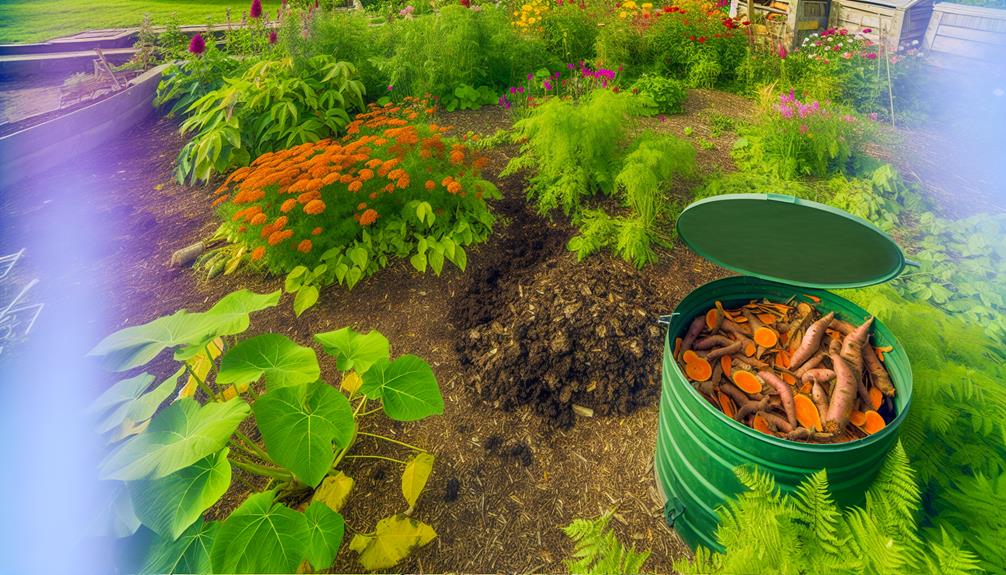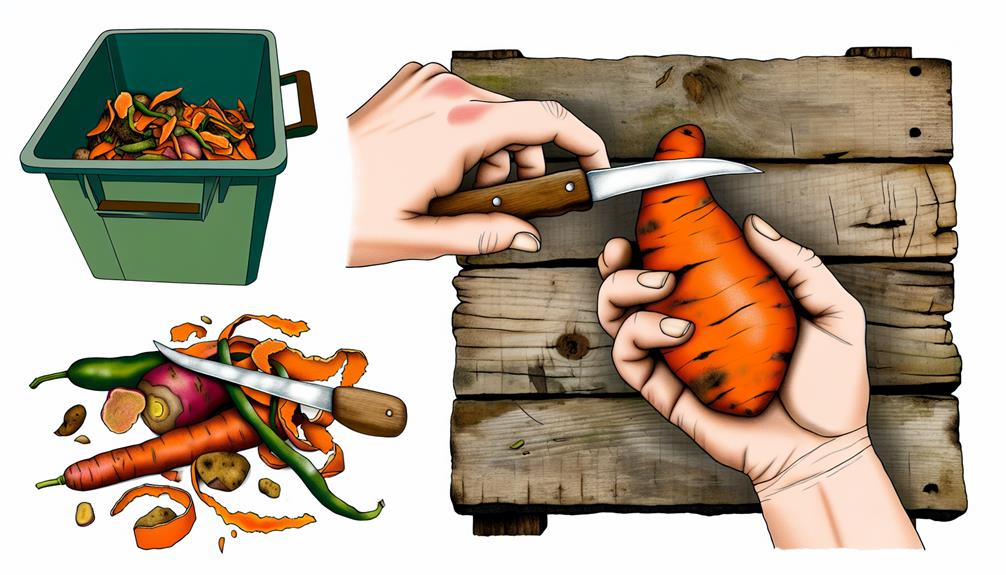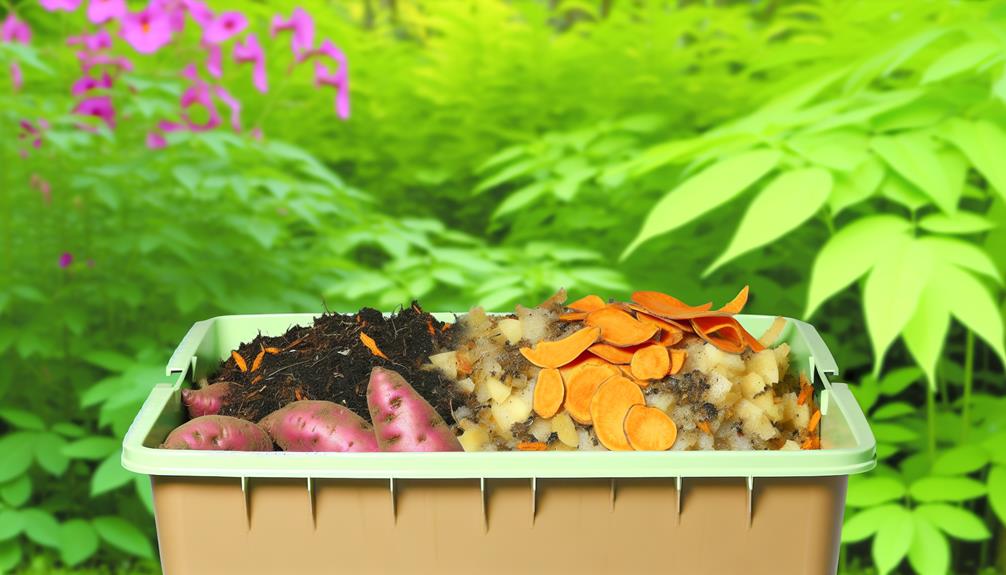

Yes, you can compost sweet potatoes. Doing so improves soil fertility, structure, and moisture retention. Start by washing and peeling the sweet potatoes, then cut them into small chunks to speed up decomposition. This reduces kitchen waste and supports sustainable gardening by lessening the need for chemical fertilizers.
Use efficient cutting methods and choose composting techniques that suit your space and lifestyle. Watch for mold and odor issues, which can be resolved by balancing brown and green materials. Finished compost can be a great natural fertilizer for your garden. Discover practical tips and methods for efficient composting.
Sweet potatoes are packed with essential nutrients like vitamins A and C, potassium, and fiber. When you’re looking to understand the nutritional profile of sweet potatoes, you’ll find they’re a powerhouse of health benefits.
Their high vitamin content, especially vitamin A, is essential for maintaining healthy vision, skin, and immune function. One medium sweet potato provides more than your daily requirement of vitamin A, which is important for overall well-being.
In addition to vitamin A, sweet potatoes are a good source of vitamin C. This vitamin is important for tissue repair, immune system support, and the absorption of iron from plant-based foods. Including sweet potatoes in your diet ensures you’re getting these key vitamins that help keep your body functioning optimally.
Potassium is another significant nutrient found in sweet potatoes. It helps regulate fluid balance, muscle contractions, and nerve signals.
Fiber is also abundant in sweet potatoes, aiding digestion and promoting a feeling of fullness, which can be beneficial if you’re managing your weight.
When you compost sweet potatoes, you’ll enrich your soil with essential nutrients, which can boost your garden’s productivity. This process also helps reduce kitchen waste, turning scraps into valuable compost instead of landfill waste.
Composting sweet potatoes greatly enhances the nutrient content of your soil, boosting its fertility and health. When you add sweet potato scraps to your compost pile, you’re contributing to an improved soil structure. The decomposed organic matter helps soil particles clump together, allowing for better water retention and aeration. This creates an ideal environment for roots to grow and thrive.
Additionally, composting sweet potatoes promotes increased microbial activity. Microorganisms break down the sweet potato material, releasing essential nutrients like nitrogen, phosphorus, and potassium back into the soil. These nutrients are crucial for healthy plant growth and can make a significant difference in your garden’s productivity.
To get the most out of composting sweet potatoes, make sure they’re chopped into smaller pieces. This accelerates the decomposition process, making nutrients available more quickly. Mix them well with other compost materials, such as leaves and grass clippings, to maintain a balanced compost heap.
Turning your kitchen scraps, like sweet potato peels, into compost greatly reduces the amount of waste you send to the landfill. By composting, you’re embracing an eco-friendly disposal method that transforms organic waste into valuable compost. This practice not only cuts down on waste but also promotes a more sustainable lifestyle.
Here’s a quick comparison of the benefits:
| Action | Impact on Waste Reduction | Eco-Friendly Disposal |
|---|---|---|
| Throwing in Trash | High waste volume | No |
| Composting | Significant waste reduction | Yes |
| Using a Garbage Disposal | Moderate waste reduction | No |
| Landfilling | High waste volume | No |
| Recycling (where possible) | Moderate waste reduction | Yes |
By incorporating compost into your garden, you enrich the soil with essential nutrients that promote healthy plant growth. Composting sweet potatoes and other organic waste helps you build a more robust and fertile garden ecosystem. You’ll find that composting benefits extend beyond just nutrient enrichment; it also improves soil structure, moisture retention, and root development.
Sustainable gardening relies heavily on practices that nurture the environment, and composting is a cornerstone of this approach. When you compost, you reduce the need for chemical fertilizers, which can harm beneficial soil organisms and lead to nutrient runoff. Instead, you create a natural cycle of renewal, turning kitchen scraps into rich, organic material that feeds your plants.
To maximize these composting benefits, make sure your compost pile is well-balanced. Include a mix of green materials, like sweet potato peels and other kitchen scraps, along with brown materials, such as dried leaves and cardboard. Regularly turning your compost pile aids aeration and speeds up decomposition, ensuring a steady supply of nutrient-rich compost.
Also Read: Can You Compost Cat Manure?
Before composting sweet potatoes, you should chop them into smaller pieces to expedite the decomposition process. Begin by washing the sweet potatoes to remove any dirt or pesticides.

Next, use effective peeling techniques to strip away the skin if you prefer, though it’s not strictly necessary for composting. A vegetable peeler or a paring knife works well for this task.
Once peeled, or if you decide to leave the skins on, proceed to cutting. Employing efficient cutting methods, you can slice the sweet potatoes into smaller chunks. Aim for pieces that are about an inch in size. This size promotes quicker breakdown and ensures the compost pile remains balanced.
Chopping sweet potatoes into uniform pieces helps them decompose evenly, making your composting process smoother. Utilize a sharp knife and a sturdy cutting board to avoid accidents and ensure clean cuts.
Remember to incorporate these steps into your routine. By doing so, you’ll not only make the decomposition process faster but also create a healthier compost pile.
These preparations will set the stage for effective composting, fostering a sense of community and shared purpose in sustainable gardening practices.
Also Read: Can You Compost Broad Beans?
Now that your sweet potatoes are prepped, let’s explore different composting methods to transform them into nutrient-rich soil. Whether you’re a seasoned composter or just starting out, there’s a method that will suit your lifestyle and space.
One common option is using compost bins. These bins can be placed in your backyard and provide an easy way to manage kitchen scraps and yard waste. Simply layer your sweet potato scraps with other organic materials, like leaves or grass clippings, to maintain a balanced compost.
Another effective method is vermicomposting systems. These systems use worms to break down organic matter quickly. Place your sweet potato pieces in a worm bin, ensuring they’re covered with bedding material like shredded newspaper. Worms will do the hard work, turning your waste into rich, worm castings.
Here’s a quick comparison to help you decide:
| Method | Ideal For | Maintenance Level |
|---|---|---|
| Compost Bins | Backyard composting | Moderate |
| Vermicomposting | Indoor/Outdoor | Low to Moderate |
| Tumbler Composters | Faster decomposition | Moderate |
| Trench Composting | Garden beds | Low |
These methods make sure your sweet potatoes contribute positively to your composting efforts. Choose the one that aligns with your needs and available space.
Also Read: Can You Compost Celery?
When composting sweet potatoes, you’ll need to address common problems like preventing mold growth and managing odor issues.

Make sure your compost pile stays aerobic by turning it regularly, which helps keep mold at bay.
For odor control, balance green and brown materials to maintain proper moisture levels.
To prevent mold growth in your compost, maintain proper aeration and moisture levels. Mold prevention starts with monitoring your compost’s moisture control. Keep the pile damp but not soggy, aiming for a sponge-like consistency. Too much water promotes mold, while too little hampers decomposition.
Turning your compost regularly helps with aeration. This process introduces oxygen, which encourages aerobic bacteria and deters mold. Aim to turn your pile every one to two weeks. Additionally, balance green and brown materials. Greens (like sweet potato scraps) provide nitrogen, while browns (like dried leaves) supply carbon. An essential ratio is important for mold control.
Here’s a quick table to guide you:
| Issue | Solution | Frequency |
|---|---|---|
| Too Moist | Add more brown materials | Check weekly |
| Too Dry | Add water, mix in greens | Check weekly |
| Poor Aeration | Turn the pile | Every 1-2 weeks |
| Mold Presence | Turn, adjust moisture | As needed |
Addressing odor issues in your compost is essential for maintaining a pleasant and effective composting environment. To guarantee your compost doesn’t become a nuisance, focus on both odor management and odor prevention.
First, balance your green and brown materials. Too many greens like sweet potato scraps can cause a smelly, anaerobic environment. Aim for a mix of:
If your compost still smells, it might be too wet or lacking aeration. To fix this, add more brown materials and mix the pile thoroughly. Also, ensure proper drainage to prevent excess moisture.
Odor prevention is about maintaining this balance consistently. Avoid adding too many sweet potato scraps at once and always cover fresh additions with brown materials. Regularly turning the pile helps it stay aerobic and reduces odor issues.
Finished compost enriches your garden soil, providing essential nutrients for robust plant growth. To maximize its benefits, you can use it in several effective ways.
One popular method is brewing compost tea. This nutrient-rich liquid acts as a natural fertilizer, promoting plant health and soil vitality. You’ll need a bucket, some water, and a small amount of finished compost. Let the mixture steep for a few days, then apply it directly to your plants’ roots.
Another excellent approach is mulch application. Spread a layer of finished compost around your garden beds. This not only enriches the soil but also helps retain moisture, suppress weeds, and regulate soil temperature. You’ll find that your plants thrive when they’ve this protective and nourishing layer.
Incorporating finished compost into your garden beds is simple. Just mix it into the top few inches of soil before planting. This guarantees that the nutrients are readily available to your plants. You can also sprinkle it around existing plants as a side dressing to give them a mid-season nutrient boost.
Yes, you can compost sweet potato leaves! Their nutrient content enhances your compost, and they break down easily during the decomposition process. Including them in your compost helps create a richer, more vibrant community garden soil.
Sweet potatoes usually take about three to six months to decompose, depending on microbial activity. To speed up decomposition time, make sure you’ve got a good mix of green and brown materials in your compost.
You can compost moldy sweet potatoes, but be cautious. Mold spores are part of the natural decomposition process and won’t harm your compost. Just mix them well with other materials to guarantee everything breaks down properly.
Sweet potatoes can attract pests in compost, but you can address this with proper pest management techniques. Guarantee good compost aeration, and you’ll minimize pest issues, creating a healthier compost and a sense of community in your garden.
You should chop sweet potatoes before composting. Chopping benefits the composting process by speeding up decomposition and enhancing compost aeration. By doing this, you contribute to a healthier compost pile and promote a thriving community garden.
To wrap up, composting sweet potatoes is both beneficial and straightforward. Start by chopping them into smaller pieces to speed up decomposition. Mix them with other compostable materials, maintaining a balanced carbon-to-nitrogen ratio.
Regularly turn your compost to guarantee proper aeration. If you encounter issues like odor or pests, adjust the mix and aeration. Once the compost is dark and crumbly, it’s ready to enrich your garden soil, promoting healthier plant growth.
